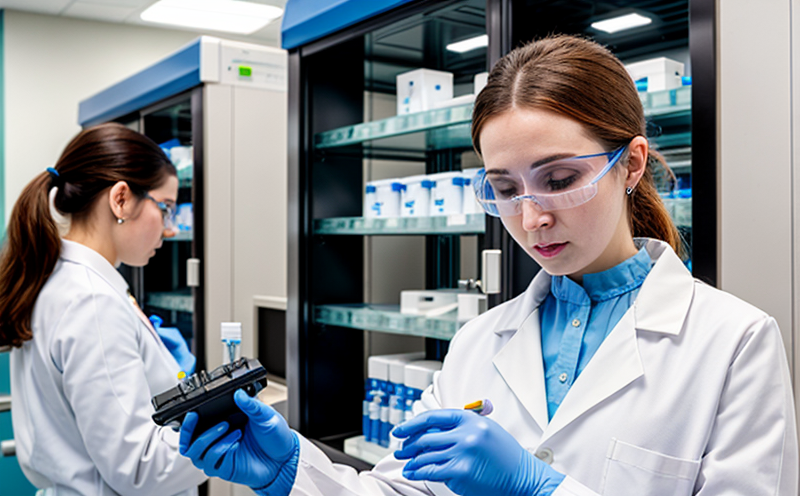Vaccine Response Biomarker Bioanalysis Testing
Understanding and measuring immune response is critical in the development of effective vaccines. Vaccine Response Biomarker Bioanalysis Testing plays a pivotal role in ensuring that the vaccine not only triggers an appropriate immune response but also does so predictably, safely, and effectively across diverse populations. This service involves a series of sophisticated bioanalytical techniques designed to assess how different individuals respond to a given vaccine candidate.
The process starts with selecting biomarkers that are indicative of immune activity following vaccination. These biomarkers can include cytokines, antibodies (both IgG and subclasses), and cellular markers like T-cell receptors or CD4/CD8 ratios. The goal is to identify which components of the immune system are activated by the vaccine and at what levels.
The testing procedure typically involves several steps: first, collection of biological samples from test subjects post-vaccination. These samples can be blood plasma, serum, or even cells isolated from peripheral blood mononuclear cells (PBMCs). The next step is sample preparation, which may include extraction and purification processes to ensure that only relevant biomolecules are analyzed.
Once prepared, the samples undergo a series of bioanalytical assays. Commonly used methods include enzyme-linked immunosorbent assays (ELISAs), flow cytometry for cellular analysis, Western blotting, and mass spectrometry for protein profiling. These tools help in quantifying the specific biomarkers at various time points post-vaccination to establish a timeline of immune response.
Interpreting these data is crucial as it helps in tailoring future vaccine formulations. For instance, if certain subgroups show suboptimal responses, adjustments can be made to enhance efficacy for those populations. This comprehensive approach not only aids in the development of safer vaccines but also ensures that they are effective across different demographics.
The accuracy and reliability of this bioanalytical testing are paramount given the high stakes involved. Compliance with international standards such as ISO 17025 is essential to ensure quality assurance throughout the process. By adhering to these standards, we can provide consistent, reproducible results that contribute significantly to vaccine development.
In summary, Vaccine Response Biomarker Bioanalysis Testing serves as a cornerstone in the advancement of immunological research and vaccine efficacy studies. Its role extends beyond mere testing; it facilitates innovation by providing insights into how different individuals respond to vaccines, thereby contributing to more personalized medicine approaches in future.
Benefits
Evaluation of immune response across diverse populations leading to personalized medicine approaches in future.
Enhanced efficacy by identifying suboptimal responses and making necessary adjustments to vaccine formulations.
Facilitation of more efficient clinical trial processes through accurate biomarker assessments.
Support for regulatory compliance with international standards, ensuring quality assurance in all testing procedures.
Contributions towards the development of safer and more effective vaccines, ultimately improving public health outcomes globally.
Environmental and Sustainability Contributions
The rigorous adherence to ISO 17025 standards not only ensures high-quality results but also contributes positively to environmental sustainability. By minimizing errors and optimizing resources through precise testing, we reduce the need for additional trials, thus conserving both time and materials. This approach supports a more sustainable healthcare industry by promoting efficient use of resources.
Additionally, this service plays a role in reducing waste associated with poorly designed or ineffective vaccines. By providing accurate biomarker data early in the development process, we help direct efforts towards successful vaccine candidates, thereby avoiding unnecessary environmental impacts from failed products.
Competitive Advantage and Market Impact
The ability to accurately measure immune responses offers a significant competitive edge in the pharmaceutical industry. With increasing demand for personalized medicine solutions, our service stands out by providing data that can be leveraged to tailor vaccines specifically for different demographic groups. This capability not only enhances product efficacy but also fosters innovation within the sector.
Our commitment to compliance with international standards further strengthens our reputation and market position. By aligning ourselves with global benchmarks, we ensure that our services are recognized as reliable and trustworthy, which is crucial in a highly regulated field like pharmaceutical testing.
The insights gained from this bioanalytical testing can also influence broader healthcare strategies, potentially leading to new markets and opportunities for collaboration within the industry. Overall, this service positions us as leaders in vaccine development support, contributing significantly to both scientific advancement and business success.





